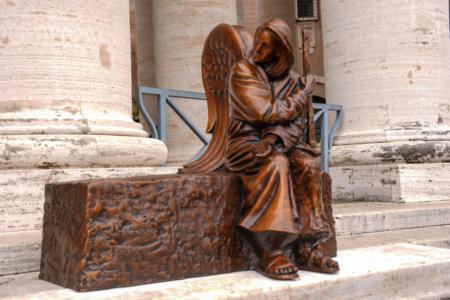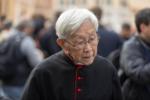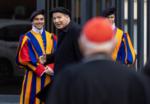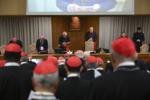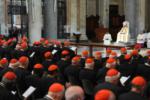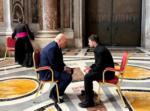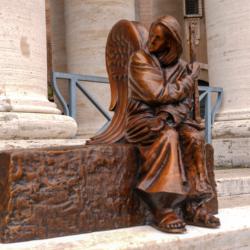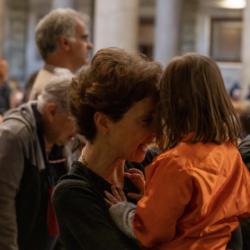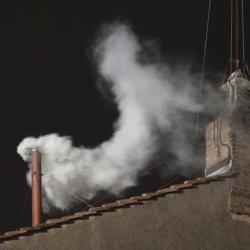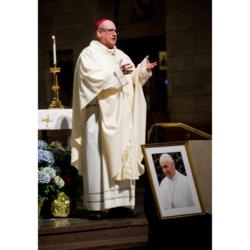Marriage issue propels candidates to seek office
SOUTH BOSTON — Citizens, motivated by the legislature’s failure to adequately preserve the traditional definition of marriage have become political candidates for statewide office.
Meeting in a Constitutional Convention in March, legislators approved a proposed amendment that would define marriage as the union of one man and one woman but at the same time enshrine same-sex civil unions into Massachusetts’ constitution. If approved in another legislative session the amendment could appear on the ballot by 2006.
Supporters of traditional marriage were angered when the legislature chose to insert same-sex civil unions into amendment.
"We want to vote on one issue and one issue only: marriage between one man and one woman," said Susan Long at a forum held by the South Boston Catholic Citizens (SBCC) at the Laboure Center on July 15. Long is challenging Sen. Jack Hart, D-Boston, who voted in favor of same-sex civil unions. In January Hart attended one of the SBCC's weekly meetings where members spoke out against civil unions, but he made it clear that he would vote for them.
Long is running for office because of the importance of this issue, she said.
"This is an uphill fight for our families, but there is no way we can lose it with the support of our community, our Church and our God," said president of Catholic Citizenship and former ambassador to the Vatican Raymond L. Flynn in an opening statement.
Every candidate — challengers and incumbents — running for a House or Senate seat representing Boston was invited to attend the forum. Eight of the over 50 candidates accepted. Six of those — Susan Long, Robert Joyce, Robert Ferencsik, Thomas White, Gilbert LaVoie and Chuck Morse — are all running against incumbents because of the same-sex marriage issue.
During the forum candidates fielded questions from a panel consisting of retired Supreme Judicial Court Justice Joseph R. Nolan, Suffolk County Registrar of Deeds and former Boston Police Commissioner Francis “Mickey” Roache, Joan Tenenbaum and Father Al DiIanni, SM. Each panel member asked one question that was answered by every candidate. Questions covered a variety of issues of concern to Catholics including same-sex marriage, abortion, embryonic stem cell research and tax cuts.
Following the period of questions, each candidate was allowed to make a closing statement.
Only one candidate, Katheryn Duggan, spoke out in favor of same-sex marriage. Duggan, an Irish Catholic, believes that same-sex marriage is a right.
"They deserve to marry their partner, they deserve to give them their health care and they deserve to visit them in the hospital," she said. Duggan's remarks were met with spattered applause. She knew her ideas would be unpopular but felt it was her responsibility to represent her beliefs, she said.
Duggan also believes that politicians have an obligation to their constituents and would vote against same-sex marriage if a majority of her constituents were against it, she said.
"I admire her for coming," Ann Corkery of Walpole said about Duggan. A practicing Catholic who supports traditional marriage, Corkery came to the meeting to support Independent candidate Robert Joyce.
South Boston Democratic Rep. Brian Wallace was the only incumbent to attend the forum. He is running unopposed for his second term. He voted against all forms of same-sex marriage and civil unions.
"It's very hard when members of the other side not only scorn you but threaten you," he said. "It's going to be more difficult next year."
Peter Murphy, a parishioner at St. Vincent de Paul Parish in South Boston, formed the SBCC in 2003 along with his pastor Father Richard E. Cannon in response to the Supreme Judicial Court’s decision legalizing same-sex marriage.
"It's given people a chance to get across their point," Murphy said of the forum. "And they brought along some constituents so the point wasn't lost."
"What we did was respond to the [archbishop] and the pope and take an active role" in public life, said SBCC member Mary Fagan. The forum was meant to promote dialogue, she said.
"Everyone, whether they were for our issues or not was respected," she said.
